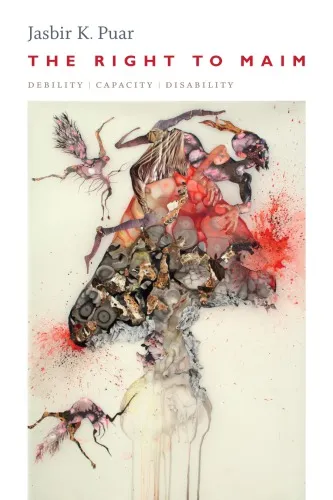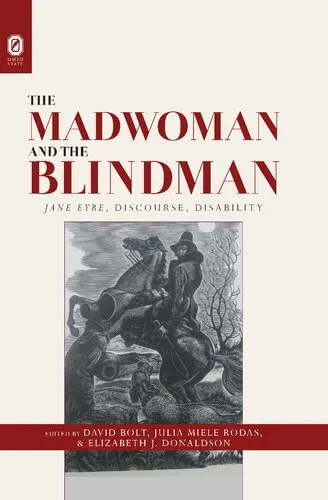The Right to Maim : Debility, Capacity, Disability
4.5
Reviews from our users

You Can Ask your questions from this book's AI after Login
Each download or ask from book AI costs 2 points. To earn more free points, please visit the Points Guide Page and complete some valuable actions.Related Refrences:
The Right to Maim: Debility, Capacity, Disability
An intellectual dive into the intertwined narratives of disability, humanitarianism, neoliberalism, and colonialism, Jasbir K. Puar's work explores the geopolitics of bodily injury and capacity through the concept of "the right to maim."
Detailed Summary of the Book
In "The Right to Maim: Debility, Capacity, Disability," Jasbir K. Puar extends her groundbreaking insights into the nexus of sexuality, race, and geopolitics. This book presents an incisive critique of state mechanisms and biopolitical governance, focusing particularly on how states deploy the capacity to injure populations. Moving beyond the binary of disability and ability, Puar introduces the concept of "debility" as a broader framework to understand the systemic production of physical injury and socio-economic impoverishment.
Puar argues that the contemporary state often fails to care for the sick and the wounded, instead perpetuating conditions that ensure their ongoing incapacity. Through an interdisciplinary approach that combines disability studies, queer theory, and postcolonial critique, she exposes how states utilize the ability to maim as part of their socio-political arsenal, manipulating bodies and populations for economic and political ends.
Her analysis particularly focuses on Israel's occupation of Palestine, using this geopolitical context to illustrate the ways in which "the right to maim" functions not only as a practice of war but as a normalized mode of governance and control. This work resonates across various fields, elucidating the entwined fates of various marginalized populations across the globe.
Key Takeaways
- Debility vs. Disability: Puar challenges traditional disability discourses by introducing "debility" as a nuanced way to understand the vulnerabilities imposed on certain populations by state mechanisms.
- The Right to Maim: This concept explores how states harness and maintain power by maiming rather than killing, utilizing long-term injury as a form of control and economic strategy.
- Intersectional Analysis: The text interweaves discussions of race, gender, sexuality, and colonialism, demonstrating their roles within the dynamics of disability and debility.
- Biopolitics and War: The work argues that biopolitical strategies of governing populations often manifest in the normalization and strategic deployment of physical injury and economic debilitation.
Famous Quotes from the Book
"Debility is meant to disrupt the binary of ability and disability, putting pressure on the former's unmarked status."
"The 'right to maim' functions as a biopolitical mechanism — and in some instances literally as a weapon — that maximizes profit generation while allowing the state to disclaim its role in the ongoing conditions of debility."
Why This Book Matters
Jasbir K. Puar's "The Right to Maim" matters because it challenges longstanding assumptions about disability and the role of the state in both creating and managing physical and economic bodies. Its critical lens on the geopolitics of injury and disability broadens our understanding of disability as not solely a medical or personal condition but as an embedded structure within global political economies and militarized strategies.
Whether one is engaging with the text from the perspective of disability studies, queer theory, postcolonial studies, or human rights, Puar's insights encourage a reevaluation of how we comprehend ability and debility and their utility in governance practices. This work importantly offers a critical framework for activists, scholars, and policymakers committed to understanding and dismantling systemic inequality and violence.
Free Direct Download
You Can Download this book after Login
Accessing books through legal platforms and public libraries not only supports the rights of authors and publishers but also contributes to the sustainability of reading culture. Before downloading, please take a moment to consider these options.
Find this book on other platforms:
WorldCat helps you find books in libraries worldwide.
See ratings, reviews, and discussions on Goodreads.
Find and buy rare or used books on AbeBooks.
1356
بازدید4.5
امتیاز50
نظر98%
رضایتReviews:
4.5
Based on 0 users review
"کیفیت چاپ عالی بود، خیلی راضیام"
Questions & Answers
Ask questions about this book or help others by answering
No questions yet. Be the first to ask!



